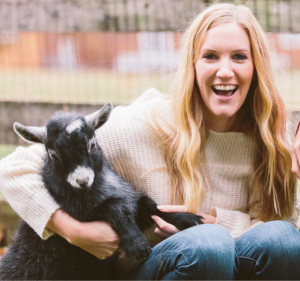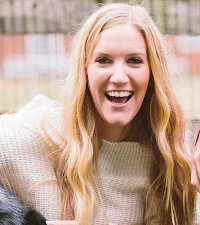Ever wonder what it’s like to be part of First San Francisco Partners? Many of our team members are consultants, and I think of them as the face of FSFP because they work directly with our valued clients and partners.
I always enjoy talking with FSFP’s consultants about what they do and recently spoke with Catherine Ruef, a consultant who’s worked here since July 2019.
Last year, Catherine became a Collibra Ranger, a certification that demonstrates her deep experience in driving the adoption and usage of Collibra in organizations. Becoming a Ranger is a significant accomplishment in our world, and Catherine aptly juggled her Collibra studies alongside her busy day job!
Ready to meet Catherine and find out why she connects her first job serving people ice cream to what she does today? Keeping reading …
As a senior consultant, what’s your typical day like?
It usually consists of many client meetings focused on addressing their needs and requirements. Client work also entails pulling together various deliverables to ensure our recommendations and solutions meet each client’s unique goals.
Internally, I guide our other consultants in all things Collibra. I serve as internal support to help in areas where they may not understand the content as well or need help thinking through how Collibra can/should be leveraged with a client. (Learn more about our Collibra consulting practice.)
How would you explain data governance to a child or grandparent?
To a child, I would say that data governance is a lot like their chore charts at school. Without chore charts, their classroom becomes messy and unorganized, just like data. Our job is to make sure the right people are involved in that “chore chart” and that it is documented correctly in a tool like Collibra.
When talking with an adult, I’d say data governance is a way of formally collaborating to understand and own data to minimize quality and regulatory issues down the road and maximize operational efficiencies.
What do you most enjoy about your job?
We work with so many diverse clients, with varying levels of challenges and different types of challenges, and I enjoy that. Even though clients have their own data-related needs and struggles, there are often similarities. This is what’s cool about what we do — seeing the similarities and appreciating the differences. It’s the type of environment that always keeps you on your toes.
What was your first job?
Serving ice cream in Cincinnati. Funny enough, I still work there and help with the hiring and scheduling. It’s been 16 years, and I can’t bring myself to leave — I mean, who wouldn’t want endless access to make your own ice cream combinations?!
What prepared you most for a career in consulting/data governance/data management?
Working with customers at an ice cream stand and at a bar/restaurant helped me learn how to deal with all sorts of personalities and remain level-headed in sometimes-stressful situations. I also worked in a large organization for seven years, both as an intern and full-time employee.
The real-world experience of using data and being part of a data governance team helps me understand data governance struggles and relate to our clients’ issues. And when I focus on asking clients the “right” questions, I can find the root cause of their issues and help them find a path forward.
What made you choose FSFP?
The first thing that drew me here was the potential for working remote (pre-COVID). I am obsessed with my dog and, before working here, I hated leaving him in a crate for nine hours a day.
Once I started to look deeper into this company, I was drawn to the flexibility of working on different projects. Prior to FSFP, I was the admin of Collibra for one company, experiencing the same use cases day in and day out. I wanted to further my knowledge and experience in other uses of the tool within other industries, and that’s how I found myself here.
Describe your consulting style.
I’m personable and flexible. Creating relationships with clients is so important, as it helps them be open and honest about the problems we are trying to solve. It’s also important to adapt to each individual client and their environment. Both go a long way in making sure you find that balance between true consulting and feeling like you’re a part of their team working toward a common goal.
Which FIRST (focus, integrity, resourcefulness, skillfulness, teamwork) value do you resonate with the most and why?
Integrity. It’s my favorite thing about FSFP. At the end of the day, I know we try to do what is best for our clients. We don’t just make recommendations based on what gives us the most business down the line or what will work best for our partners. We want to set each client up for success, and it is cool to see the shared passion from everyone here as we set our clients on their path to success.
What is the best advice you ever received?
Growing up, anytime I’d come across someone who’s rude or who I’d have a bad experience with, my mom would say, “You don’t know what they have going on in their life.” This is such a good way of looking at negative experiences in life and consulting. In consulting, we come across difficult situations every now and again. Rather than getting frustrated or defensive, if you look at it through that lens of not knowing what is going on in the person’s workday or where their job pressure comes from, it is easier to show sympathy and understanding and be more productive in finding a solution.
Again, it all goes back to forming those positive relationships with people and working toward a common goal.
What advice would you give to someone considering a job in data management or data governance?
Do your homework and research. Data is everywhere and has become such an important part of our lives. What “non-data people” don’t realize is that you need people, process, technology and policies to back up that data — and orchestrating all of that takes a lot of work.
COVID is a great real-world example. You have to ask how accurate the numbers are, how were they potentially transformed and how were they collected, things like that, because there’s a whole story behind every piece of data and it needs to be managed.
Everyone generally trusts technology today, and it’s easy to forget you need actual people behind the collection, use and distribution of data.
What’s your best work-from-home tip?
Technically speaking, have superb Wi-Fi. It’s so important on video calls. Also, make sure you have a healthy balance. It is easy to just keep working through the night and never close your laptop and ignore certain things when you work remote. So, set aside time for yourself, like going for a walk and stopping to eat lunch.

What do you like to do in your free time?
I go to a family friend’s farm and help out with their horses and goats and just enjoy being out of the house or “office” in the fresh air surrounded by nature. I also come from a big family with many nieces and nephews, so any chance I can get to spend time with them brightens my day.
What do you see as the future of data?
Data is such a powerful tool to help us make informed decisions, but those decisions need to be based on good data and good algorithms. As artificial intelligence and machine learning become bigger and bigger, more regulations will be introduced down the line. We need to think about who’s making the algorithms for data-based decisions, the data used in those algorithms and how they are being leveraged.
I don’t think that the future of regulations is just going to be, this is my personal data — don’t sell it. There will be an increased need to not only understand what data you have but also how it is being used. Data governance will play a big role in facilitating those processes and approvals.
I hope you enjoyed learning more about Catherine and her work at FSFP. We continue to highlight other members from our team on our blog in our Meet the Team series.



